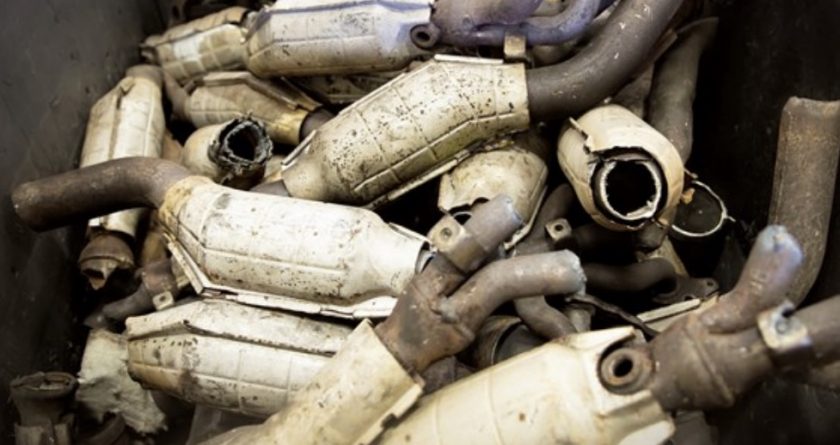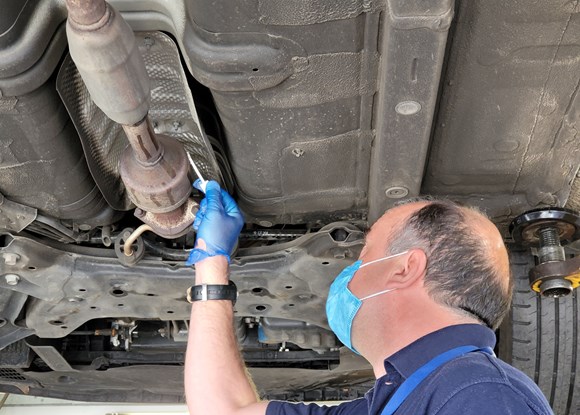Catalytic converter thefts drop as people take action to protect their vehicles

Reports of catalytic converter thefts across the UK have dropped by 57 per cent, as people opt to forensically mark their vehicles.
Catalytic converter thefts peaked in March 2021, with 3,245 recorded in the UK that month. Thefts have steadily declined since, with 1,378 recorded in July.
A surge in the price of precious metals saw theft of catalytic converters become a national issue earlier this year, and police across the UK joined forces to combat the trend.
In April, British Transport Police (BTP) coordinated a multi-agency operation to tackle catalytic converter theft. Over a thousand stolen catalytic converters were recovered and more than 50 people were arrested. During the week, over a thousand vehicles were also forensically marked by officers and partner agencies.
In addition, a national asset database was created to register catalytic converters, allowing police to identify whether recovered catalytic converters are stolen.
Catalytic converters are marked with a uniquely formulated and heat-resistant solution created by SmartWater, which is linked on the database to a specific vehicle.
SmartWater scientists can identify the vehicle it came from with just a fragment of the solution, increasing the chance of thieves being caught.
The database is operated by the Centre for Infrastructure and Asset Protection (CIAP), an intelligence unit made up of analysts who are accredited police contractors, tracking organised crime groups around the UK.
They work with police on the National Infrastructure Crime Reduction Partnership (NICRP), which is led by BTP, to reduce and tackle crime.
National Police Chiefs’ Council Lead for Vehicle Crime, Cheshire Police Assistant Chief Constable Jenny Simms, said:
“It’s pleasing to see that we are already seeing positive results from this multi-agency operation, however we know that there is still a long way to go.
“Policing and law enforcement agencies will continue to work with manufacturers and other partners to focus on catalytic converter theft and ensure that this crime, perceived as low risk/high-reward is relentlessly targeted, and offenders are brought to justice.”
National Police Chiefs’ Council Lead for Metal Crime, BTP Assistant Chief Constable Charlie Doyle, said:
“We recognise the disruptive and costly impact catalytic converter theft has on victims, so we’re very pleased that we are starting to see it decreasing.
“This positive reduction is testament to why it’s vital we join forces to share information and specialist knowledge to disrupt those operating in this area of crime.”
NICRP lead and BTP Superintendent, Mark Cleland, said:
“Thanks to the support of the Home Office in creating the NICRP, our joint working with Smartwater and other industry partners, and the drive by enforcement partners across the UK, we have made a real impact in tackling metal and catalytic converter crime.
“While arrests continue to be made, it is the preventative approach through the forensic marking of catalytic converters that gives motorists the opportunity to protect their property and stop the crime in the first place.”
Director of CIAP, Rachael Oakley, added:
“We’re delighted, but not surprised, that this police initiative is deterring theft of catalytic converters, as criminals avoid traceable property, whether it’s vehicle parts, copper cable or jewellery.
“SmartWater is working with Toyota to protect and forensically mark catalytic converters – one of the benefits of this is that it provides irrefutable evidence linking the criminal to the crime. This has been achieved through accreditation with the forensic science regulator ensuring the evidence stands up to scrutiny in a court of law.
“A national network of registration centres will be open shortly for car owners to register their catalytic converters for a small fee – contact SmartWater via the website for further information on locations and times.”
Reports of catalytic converter theft should be made as soon as possible to increase the chances of detection.
People are encouraged to report any suspicious activity to the police by calling 101, or 999 if an offence is in progress. If you spot something at a railway station, contact BTP by texting 61016 or calling 0800 40 50 40.
Alternatively, anonymous reports can be made to Crimestoppers online or by calling 0800 555111.
Spotted something? Got a story? Email: [email protected]
Latest News

